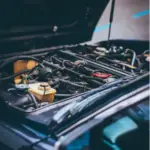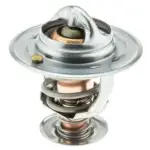Check engine lights are arguably the most frustrating thing to see while driving. However, with proper knowledge you can troubleshoot the problem yourself and save tons of money. So what are P0171 and P0174 codes? These engine codes are OBD-II codes which stands for onboard engine diagnostics. Every vehicle since 1996 regardless of make has an OBD-II system.

The P0171 means that bank 1 of your engine is lean and P0174 means that bank 2 is lean. So what are banks? Banks refer to the side of the engine block. If your engine is a V6 or V8 it will have two banks. Half of the cylinders will be on one side and the other half on the other side. If your engine is an inline cylinder configuration you won’t have multiple banks.
Lean Engine Basics
A car’s engine has a complex system for determining the appropriate air to fuel mixture. Air will enter through the intake which the MAF (mass air flow) will measure the amount of air entering the engine. The PCM (powertrain control module) will then adjust the amount of fuel injected into the cylinders based on the intakes air flow.
For non-turbocharged or supercharged engines, the ideal air to fuel ratio is 14.7:1. This is 14.7 parts air and 1 part vaporized gasoline. This ratio is crucial because it is the ratio that will burn all of the fuel with no excess air.
If your engine has too much air entering into the combustion chamber the O2 (oxygen) sensor in the exhaust will detect the excess air. The PCM will then take the O2’s reading to increase the fuel injected into the cylinders to return the ratio to normal. However, the engine can only compensate so much. Once the engine can no longer compensate for the amount of extra air entering the engine, a check engine light will be triggered.
Damages of a Lean Running Engine
While your engine may be able to run lean for awhile, it certainly isn’t good for it. A lean engine with at low rpms and a high load is a recipe for disaster. Under these conditions detonation can occur. Detonation is what happens when the air/fuel mixture is ignited in isolated pockets throughout the cylinder. This can cause knocking noises and serious engine damage.
Another reason to address lean P0171 and P0174 codes as soon as they appear is that lean air/fuel mixtures can make an engine run hot. High temperatures can raise the stress on your engines components shortening their life and high temps can also degrade oil.
In summary if your engine has a P0171 or P0174 code address it as soon as possible. Just because its running fine today doesn’t mean it will tomorrow.
What Causes P0171 and P0174 Codes
Now that you know what P0171 or P0174 codes mean. Lets go over what triggers these codes at ultimately why your engine is running lean. The check engine light will eliminate based on the oxygen reading of the O2 sensor in the exhaust. Many people make the mistake of thinking the O2 sensor is bad, but replacing the sensor is really just shooting the messenger. To troubleshoot these codes you have to look at why your engine is getting too much air or too little fuel.

Another thing to keep in mind is whether or not both banks are running lean or just one bank. If both banks are running lean, its unlikely that the problem is related to your fuel injectors, as fuel injectors on both banks would’ve had to of clogged at the same time. However, if the fuel filter was clogged, that could affect both banks. So keep that in mind while troubleshooting. Now lets look at the common causes of these codes.
Dirty MAF Sensor
The MAF (mass air flow) sensor measures the amount of air coming in through the intake. If these sensor is dirty its measurement will be off. A dirty sensor will cause your engine to miscalculate the air/fuel mixture that the engine requires, and it could cause the P0171 or P0174 codes.
Thankfully the fix is easy. All you have to do is unplug the battery. Remove the MAF sensor. Spray it with MAF sensor cleaner, and be sure to use cleaner designed for this sensor as other cleaning products can damage the sensor. After the sensor dries, reinstall it and reconnect the battery.
PCV Valve
PCV (positive crank ventilation) valves can cause a lot of issues with your engine. They should be part of your vehicle’s regular maintenance. To learn how this valve works, check out our article here. The good news is that these valves are cheap and easy to replace. The bad news is that if you don’t replace them, they can clog up.
A clogged PCV valve won’t regulate air flow like it should. This can cause lean fuel mixtures and engine codes. Because an engines vacuum is very high at idle, a faulty PCV valve will likely be most noticeable at idle. This is a very a common problem especially on higher mileage vehicles. If you don’t remember the last time this valve was replaced, its probably time to replace it.
Vacuum Leak
An engine operates in a sealed environment. When a piston strokes downward and the intake valve is open (somewhat like a syringe stroking downward), it creates a vacuum (suction) force. This force sucks the air and fuel mixture into the combustion chamber.
Problems can occur if your engine’s intake is not properly sealed i.e. has a leak. Vacuum leaks in the intake will definitely cause an increase in the amount of air sucked into the engine, and if the leak is behind the MAF sensor, your engine won’t know about the excess air until the O2 sensor picks it up in the exhaust.
Symptoms of vacuum leaks include rough engine idling, stalling, hissing from the engine bay, and check engine lights like P0171 and P0174 codes. You can also determine vacuum leaks by looking at the long and short term fuel trims, but we’ll get into that in another post.
Determining if you have a vacuum leak easier than finding out where the leak is. Its a good idea to do research on the internet to find out if your specific engine and vehicle has common vacuum leak locations. For instance if you have a Ford F150 5.4l with a P0171 and P0174 code, a common location is the intake gaskets.
One of the best ways to determine the source of the leak is by using a smoke machine. Many professional mechanics will have these machines and be able to inspect your vehicle. If you want to do it yourself, you could squirt water near the intake gaskets and intake manifold and listen for changes in your engine’s idle. If the engine struggles with each spray of water, then it is sucking the water into the combustion chamber through the leak location.
Fuel Pump
If your engine is running lean in both banks, you need to look at factors that will affect the air or fuel delivery to both sides of the engine. A worn or bad fuel pump could cause your engine to not receive the fuel it needs for the load its under. This could cause an excess of oxygen to be left over after combustion. Check out our article on the 6 most common symptoms of a bad fuel pump.
Fuel Filter
Many people don’t think about their fuel filter or the replacement interval for their fuel filter. This is probably because a vehicle can still work pretty well with a partially clogged filter, and its not uncommon for filters to last 100,000 miles (not recommended). Despite a filter’s longevity, it does need to be replaced to avoid fuel delivery issues.
A clogged filter can significantly impact fuel delivery, engine performance (especially under load), and it can even stall your engine. A partially clogged filter could definitely cause a lean P0171 and P0174 code by restricting the amount of flow supplied to the engine.
Fuel Pressure Regulator
A fuel pump needs a pressure regulator so that the fuel lines and components aren’t damaged by over pressurized fuel. However if your fuel pressure regulator is stuck open or not working properly, it could significantly lower the pressure of the supply fuel. Low pressure will mean that the engine will struggle to get the fuel it needs to run properly, and this is another possible cause for P0171 or P0174 codes.
Conclusion
P0171 and P0174 are serious engine codes and they should be addressed as soon as possible. While this post goes over some of the most common causes these codes occur, it is not an all inclusive list. The more data you can get from your vehicle the easier it will be to diagnose.




